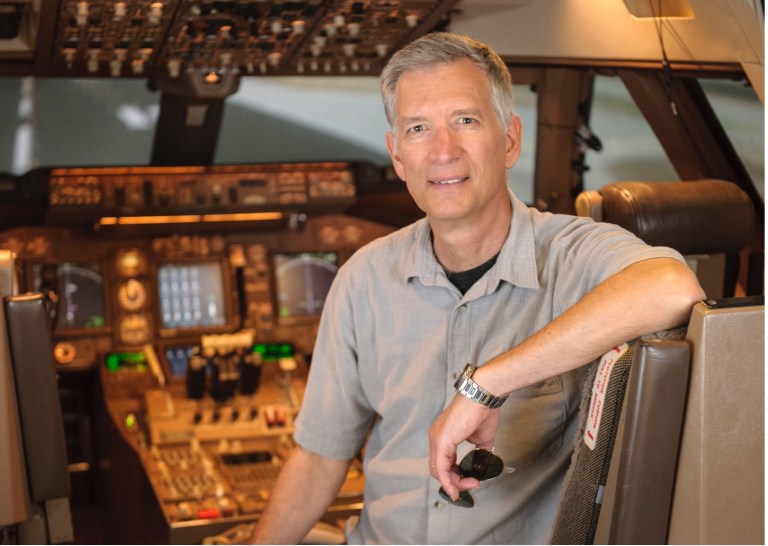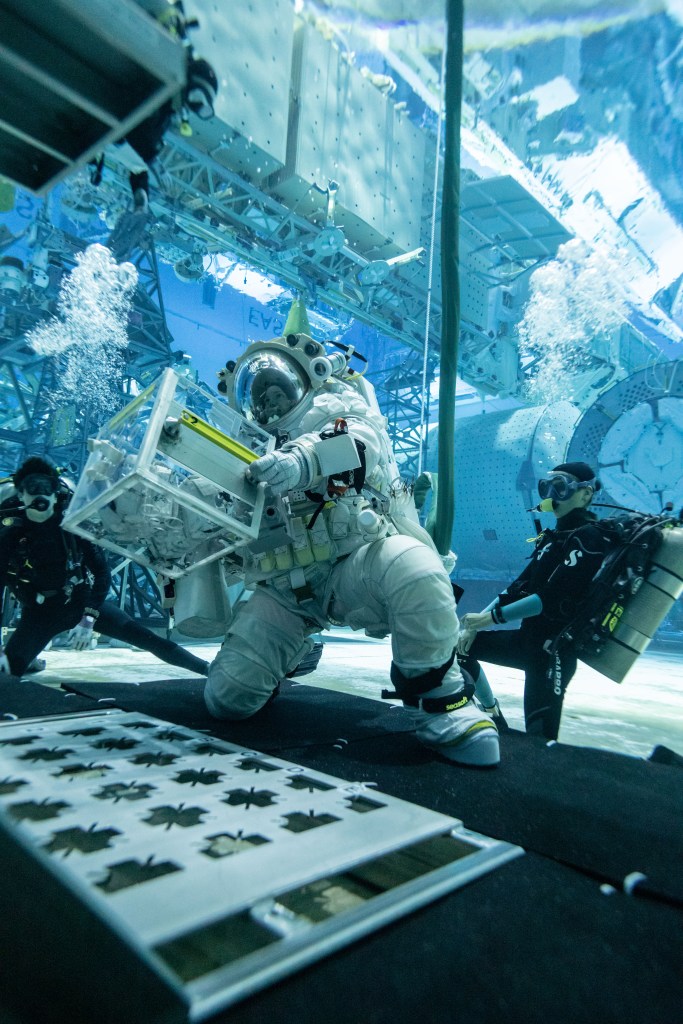
Immanuel Barshi
Research Psychologist
Affiliation– NASA Ames Research Center
Division– Human Systems Integration Division (TH)
Email– immanuel.barshi@nasa.gov
Phone– 650-279-3680
Professional Bio.
Immanuel Barshi is a Senior Principal Investigator in the Human Systems Integration Division at NASA Ames Research Center. His current research addresses cognitive issues involved in the skilled performance of astronauts and pilots, as well as mission controllers and air traffic controllers, their ability to manage challenging situations, and their vulnerability to error. Among the topics investigated by his research group are spatial reasoning, decision making, risk assessment, communication, safety culture, and skill acquisition and retention. The results of his work have been implemented in checklist design, operational procedures, and training programs in space, aviation, medicine, and nuclear facilities.
Dr. Barshi holds PhDs in Linguistics and in Cognitive Psychology. He has published books and papers in basic and applied psychology, linguistics, and aviation. He holds Airline Transport Pilot certificate with A320, A330, B737, and CE500 Type Ratings; he is also a certified flight instructor for airplanes and helicopters, with over 40 years of flight experience.
Education
- Ph.D. in Cognitive Psychology, University of Colorado, Boulder, 1998.
- Ph.D. in Linguistics, University of Colorado, Boulder, 1997.
- Master of Arts in Psychology, University of Colorado, Boulder, 1995.
- Master of Arts in Linguistics, University of Colorado, Boulder, 1992.
- Master of Arts in English Literature, Central Missouri State University, 1988.
- Bachelor of Science in Aviation Technology, Central Missouri State University, 1987
Awards/Honors
- NASA Honor Award- Exceptional Service Medal (2025)
- Ames Honor Award Scientist/Researcher Award (2024)
- Ames Superior Accomplishment Award (2019)
- JSC Group Achievement Award (2016)
- NASA Human Research Program Peer Award (2015)
- NASA Honor Award Group Achievement Award (2014)
- USAF ACC Director’s Award (2013)
- NASA Honor Award Group Achievement Award (2013)
- NESC Honor Award Group Achievement Award (2012)
- NASA Human Research Program Peer Award (2012)
- Distinguished Alumni Award. University of Central Missouri (2012)
- NASA Honor Award Group Achievement Award (2009)
- United Space Alliance Quest for Excellence Group Award (2008)
- Ames Honor Award Group Achievement Award (2008)
- NASA Group Achievement Award (2007)
- Southwest Airlines Good Neighbor Award (2007)
- NESC Group Achievement Award (2004)
- Ames COTR of the Year Award (2002).
- NASA Honor Award TGIR Award (2001)
Books
- Barshi, I., Farris, C. (2013). Misunderstandings in ATC Communication: Language, Cognition, and Experimental Methodology. Burlington, VT: Ashgate.
- Loukopoulos, L. D., Dismukes, R. K., & Barshi, I. (2009). The Multitasking Myth: Handling complexity in real-world operations. Burlington, VT: Ashgate.
- Payne, D. L., and Barshi, I. (Eds.). (1999). External Possession. Amsterdam: John Benjamins.
Journal Articles/Book Chapters/Conf. Proceedings
- Barshi, I. (2025). In, on, and out of the loop. HindSight, 36, 18-21.
- Barshi, I., Degani, A., Mauro, R., & Mumaw, R. J. (2024). Models of Human-Automation Systems: Initial Analysis of the Boeing 737MAX Design. Proceedings of the 67th Human Factors and Ergonomics Society Annual Meeting, 0(0). https://doi.org/10.1177/10711813241279805
- Kole, J. A., Barshi, I., Healy, A.F., & Schneider, V. I. (2023). Astronaut Candidate, Candidate-Like, and Undergraduate Subjects Compared on Retention and Transfer. Aerospace Medicine and Human Performance, 94, 902-910.
- Healy, A.F., Schneider, V. I., Kole, J. A., & Barshi, I. (2023). Following navigation instructions: Interdependent spatial and verbal working memory processes. American Journal of Psychology, 136, 129-141.
- Barshi, I., Degani, A., Mauro, R., & Mumaw, R., (2023). Analysis of the
- Boeing 737MAX accidents: Formal models and psychological perspectives. In Proceedings of the 22ndInternational Symposium on Aviation Psychology, (pp. XX-XX).
- Barshi, I., Matthews, B., & Feldman, J., (2023). Extracting lessons of resilient using machine mining of the ASRS database. In Proceedings of the 22nd International Symposium on Aviation Psychology, (pp. XX-XX).
- Barshi, I. (2021). Making it easy for people to do the right things. HindSight, 32, 10-12.
- Barshi, I. (2021, September 14). What’s happening to checklist discipline? AeroSafety World, Fligth Safety Foundation. https://flightsafety.org/asw-article/insight-avoiding-traps/.
- Barshi, I. (2021). What’s going on here? Is it me? Or is it the checklist? American Airlines’ Safety Preflight, August, 2021, 4-6.
- Feldman, J., Barshi, I., Smith, B., & Matthews, B. (2021). Reports of resilient performance: Investigating operators’ descriptions of safety-producing behaviors in the ASRS. In Proceedings of the 21st International Symposium on Aviation Psychology, (pp. 122-127).
- Dempsey, D.L., & Barshi, I. (2021). Applying Research-Based Training Principles: Towards Crew-Centered, Mission-Oriented Space Flight Training (pp. 63-80). In Landon, L.B., Slack, K.J., and Salas, E. (Eds.). Psychology and Human Performance in Space Programs. Abingdon, UK: Taylor & Francis.
- Kole, J.A., Healy, A.F., Schneider, V., & Barshi, I. (2021). Training Principles for Declarative and Procedural Tasks (pp. 131-149). In Landon, L.B., Slack, K.J., and Salas, E. (Eds.). Psychology and Human Performance in Space Programs. Abingdon, UK: Taylor & Francis.
- Healy, A. F., Schneider, V. I., Buck-Gengler, C. J., Kole, J. A., & Barshi, I. (2020). Intention to respond in a special way protects against forgetting associations even when working memory is occupied. American Journal of Psychology, 133, 415-426.
- Fuerch, J.H., Sanderson, P., Barshi, I., & Liley, H. (2019). Developing safe devices for neonatal care. Seminars in Perinatology, 43/ 8, 151-176.
- Healy, A. F., Kole, J. A., Schneider, V. I., & Barshi, I. (2019). Training, retention, and transfer of data entry perceptual and motor processes over short and long retention intervals. Memory & Cognition, 47, 1606-1618.
- Schneider, V. I., Healy, A. F., Carlson, K. W., Buck-Gengler, C. J., & Barshi, I. (2019). How much is remembered as a function of presentation modality? Memory, 27, 261-267.
- Barshi, I., & Bienefeld, N. (2018). When Silence is Not Golden. In Hagen, J.U. (Ed) How Could This Happen: Managing Errors in Organizations (pp. 45-57). Berlin: Palgrave Macmillan.
- Schneider, V. I., Healy, A. F., Kole, J. A., & Barshi, I. (2018). Does spatial information impact immediate verbatim recall of verbal navigation instructions? Psychonomic Bulletin & Review,25, 681-687. (DOI: 10.3758/s13423-017-1379-4).
- Barshi, I., Degani, A., Mauro, R., & Loukopoulou, L. (2017). Guiding the Practice: The 4Ps. HindSight, 25, 50-53.
- Feldman, J., Barshi, I., Degani, A., Loukopoulou, L., & Mauro, R. (2017). Designing Flightdeck Procedures: Literature Resources with Abstracts and Summaries. NASA Technical Publication TP-2017-219479. Moffett Field, CA: NASA Ames Research Center.
- Barshi, I., Mauro, R., Degani, A., & Loukopoulou, L. (2016). Designing Flightdeck Procedures. NASA Technical Memorandum TM-2016-219421. Moffett Field, CA: NASA Ames Research Center.
- Barshi, I., Statler, I. C., & Orr, J. S. (2015). The Human Factors of an early space accident: Flight 3-65 of the X-15. In T. Sgobba & I. Rongier (Eds.). Space Safety is No Accident (pp. 267-276). New York: Springer International Publishing.
- Orr, J. S., Statler, I. C., & Barshi, I. (2015). The X-15 3-65 Accident: An Aircraft Systems and Flight Control Perspective. In T. Sgobba & I. Rongier (Eds.). Space Safety is No Accident (pp. 249-258). New York: Springer International Publishing.
- Healy, A. F., Tack, L. A., Schneider, V. I., & Barshi, I. (2015). Training specificity and transfer in time and distance estimation. Memory & Cognition, 43, 736-747.
- Schneider, V. I., Healy, A. F., Barshi, I., & Bourne, L. E., Jr. (2015). Effects of difficulty, specificity, and variability on training to follow navigation instructions. Psychonomic Bulletin & Review, 22, 856-862.
- Barshi, I. (2015). From Healy’s training principles to training specifications:
- The case of the Comprehensive LOFT. American Journal of Psychology, 128, 219-227.
- Healy, A. F., Schneider, V. I., & Barshi, I. (2015). Specificity and transfer in learning how to follow navigation instructions. In J. G. W. Raaijmakers, A. H. Criss, R. L. Goldstone, R. M. Nosofsky, & M. Steyvers (Eds.), Cognitive modeling in perception and memory: A Festschrift for Richard M. Shiffrin (pp. 259-273). New York: Psychology Press.
- Barshi, I., & Statler, I. C. (2014). The Human Factors of an early space accident: Flight 3-65 of the X-15. NASA Technical Memorandum TM-2014-218414. Moffett Field, CA: NASA Ames Research Center.
- Dennehy, C. J., Orr, J. S., Barshi, I., & Statler, I. C. (2014). A comprehensive analysis of the X-15 Flight 3-65 accident. NASA Technical Memorandum TM-2014-218538. Hampton, VA: NASA Langley Research Center.
- Degani, A., Barshi, I., & Shafto, M. (2013). Information organization in the airline cockpit: Lessons from flight 236. Journal of Cognitive Engineering and Decision Making, 7, 330-352.
- Barshi, I, & Feldman, J. (2013). The safety and ethics of crew meals. In S. J. Landry (Ed.), Advances in human aspects of aviation (pp. 472-480). Boca Raton, FL: CRC Press.
- Healy, A. F., Schneider, V. I., McCormick, B., Fierman, D. M., Buck-Gengler, C. J., & Barshi, I. (2013). Which modality is best for presenting navigation instructions? Journal of Applied Research in Memory and Cognition, 2, 192-199.
- Loukopoulos, L., & Barshi, I. (2012). Close interactions of the disconnected kind. HindSight, 16, 50-53.
- Barshi, I., Degani, A., Iverson, D., & Lu, P. J. (2012). Using medieval architecture as inspiration for display design: Parameter interrelationships and organizational structure. Proceedings of the 56th Annual Meeting of the Human Factors and Ergonomics Society, (pp. 1799-1803).
- Mauro, R., Degani, A., Loukopoulos, L., & Barshi, I. (2012). The operational context of procedures and checklists in commercial aviation. Proceedings of the 56th Annual Meeting of the Human Factors and Ergonomics Society, (pp. 758-762).
- Barshi, I., & Loukopoulos, L. D. (2012). Training for real world job performance. In A. F. Healy & L. E. Bourne, Jr. (Eds.). Training cognition: Optimizing efficiency, durability, and generalizability (pp. 287-306). New York: Psychology Press.
- Martin, L., O’Keefe, W., Schmidt, L., Barshi, I., Mauro, R. (2012). Houston, we have a problem solving model for training. Journal of Organizational Psychology, 12, 57-68.
- Barshi, I., & Healy, A. F. (2011). The effects of spatial representation on memory for verbal navigation instructions. Memory & Cognition, 39, 47-62.
- Schneider, V. I., Healy, A. F., Barshi, I., & Kole, J. A. (2011). Following navigation instructions presented verbally or spatially: Effects on training, retention, and transfer. Applied Cognitive Psychology 25, 53–67.
- Loukopoulos, L. D., Dismukes, R. K., & Barshi, I. (2009, August). The perils of multitasking. AeroSafety World. A Journal of the Flight Safety Foundation, 18-23.
- Healy, A. F., Schneider, V. I., & Barshi, I. (2009). Cognitive processes in communication between pilots and air traffic control. In E. B. Hartonek (Ed.), Experimental psychology research trends (pp. 45-77). Hauppauge, NY: Nova Science Publishers.
- Mauro, R. & Barshi, I (2009). Risk Assessment in Aviation. Proceedings of the 15th International Symposium on Aviation Psychology, (pp. 214-219).
- Feldman, J. and I. Barshi (2007). The effects of blood glucose levels on cognitive performance: A review of the literature. NASA Technical Memorandum 2007-214555. Moffett Field, CA: NASA Ames Research Center.
- Heymann, M., Degani, A., & Barshi, I. (2007). Generating Procedures and Recovery Sequences: A Formal Approach. Proceedings of the 14th International Symposium on Aviation Psychology, April 22-25, 2007, Dayton, Ohio, 252-257.
- Mauro, R. & Barshi, I. (2006). Evaluating Computer Based Training for In Flight Icing. Proceedings of the American Institute of Aeronautics & Astronautics, Reno, NV.
- Burian, B. K., Barshi, I., & Dismukes, R. K. (2005). Many factors affect crew effectiveness in handling emergency or abnormal situations. ICAO Journal, 60:6, 16-32.
- Burian, B. K., Barshi, I., & Dismukes, R. K. (2005). The challenge of aviation emergency and abnormal situations. NASA TM-2005-213462.
- Schneider, V. I., Healy, A. F., & Barshi, I. (2004). Effects of instruction modality and readback on accuracy in following navigation commands. Journal of Experimental Psychology: Applied, 10, 245-257.
- Loukopoulos, L.D., Dismukes, R. K., & Barshi, I. (2003). The Challenge of Routine Flight Operations. In M. H. Lutzhoft (Ed.), Proceedings of the 22nd European Conference on Human Decision Making and Manual Control, 2-4 June, 2003, Linköping University, Sweden, 175-185.
- Mauro, R. & Barshi, I. (2003). Cognitive science and aviation training: Foundations for effective learning and operational application. Proceedings of the World Aviation Congress. Montreal, Canada.
- Burian, B. K., & Barshi, I. (2003). Emergency and abnormal situations: A review of ASRS reports. In R. Jensen (Ed.) Proceedings of the 12th International Symposium on Aviation Psychology. Dayton, Ohio: Wright State University Press.
- Bischoff, J.M., & Barshi, I. (2003). Flying on empty: ASRS reports on the effects of hunger on pilot performance. Proceedings of the 12th International Symposium on Aviation Psychology, Dayton, Ohio, 125-129.
- Mauro, R. & Barshi, I. (2003). Training Smart: Using principles of cognitive science in aeronautical education and training. Proceedings of the American Institute of Aeronautics & Astronautics, Reno, NV.
- Burian, B. K., Dismukes, R. K., & Barshi, I. (2003). The Emergency and Abnormal Situations Project. In T. McCarthy (Ed.), Proceedings of the ISASI 2003 Conference. Washington, D.C.: ISASI.
- Barshi, I., & Healy, A. F. (2002). The effects of mental representation on performance in a navigation task. Memory & Cognition, 30, 1189-1203.
- Healy, A. F., Buck-Gengler, C. J., Barshi, I., Parker, J. T., Schneider, V. I., Raymond, W. D., LaVoie, N. N., Bowles, A. R., Pauli, P., Fisher, J. A., & Bourne, L. E., Jr. (2002). Optimizing the durability and generalizability of knowledge and skills. In S. P. Shohov (Ed.), Advances in psychology research (Vol. 8, pp. 103-174). Huntington, NY: Nova Science Publishers. Also reprinted in S. P. Shohov (Ed.), Trends in Cognitive Psychology (2002, pp.123-192). Hauppauge, NY: Nova Science Publishers.
- Mauro, R., Barshi, I, & Pederson, S. (2001). Affect, Experience, & Aeronautical Decision-making. Proceedings of the 11th International Symposium on Aviation Psychology, Ohio State University.
- Barshi, I., & Chute, R. (2001). Cross wires: What do pilots and controllers know about each other’s job? Flight Safety Australia, 5, 3, 58.
- Mauro, R., and Barshi, I. (2000). Aircrew decision training and evaluation using the internet. Proceedings of the 19th Digital Avionics System Conference (pp. 5.B.5-1 – 5.B.5-8). Piscataway, NJ: Institute of Electrical and Electronic Engineers, Inc.
- Feary, M., Barshi, I., Sherry, L., and Alkin, M. (2000) “Why is it doing that?” Two perspectives on an autoflight system. In R. S. Jensen (Ed.), Proceedings of the Tenth International Symposium on Aviation Psychology(pp. 1304-1307). Columbus, OH: The Ohio State University.
- Mauro, R., and Barshi, I. (1999). Using an Internet-Based Decision Research System in Aviation Research. In R. S. Jensen (Ed.), Proceedings of the Tenth International Symposium on Aviation Psychology (pp. 848-853). Columbus, OH: The Ohio State University.
- Mauro, R., and Barshi, I. (1999). Effects of emotion on memory for communication in simulated flight and analog tasks. In R. S. Jensen (Ed.), Proceedings of the Tenth International Symposium on Aviation Psychology (pp. 1331-1336). Columbus, OH: The Ohio State University.
- Payne, D. L., and Barshi, I. (1999). External possession: What, how, where and why. In Payne, D. L., and I. Barshi, (Eds.), External possession (pp. 3-29). Amsterdam: John Benjamins.
- Mauro, R., and Barshi, I. (1999). Using an Internet-Based Decision Research System in Aviation Training Research. Proceedings of the International Aviation Training Symposium (pp. 241-250). Oklahoma City, OK: The FAA Academy.
- Barshi, I., and Healy, A. F. (1998). Misunderstandings in voice communication: Effects of fluency in a second language. In Healy, A. F., & Bourne, L. E. Jr. (Eds.), Foreign language learning: Psycholinguistic studies on training and retention (pp. 161-192). Mahwah, NJ: Erlbaum.
- Barshi, I., and Payne, D. L. (1998). Argument structure and Maasai possessive interpretation: Implications for language learning. In Healy, A. F., & Bourne, L. E. Jr. (Eds.), Foreign language learning: Psycholinguistic studies on training and retention (pp. 213-230). Mahwah, NJ: Erlbaum.
- Healy, A.F., Barshi, I., Crutcher, R.J., Tao, L., Rickard, T.C., Marmie, W.R., Schneider, V.I., Feldman, A., Buck-Gengler, C.J., Romero, S.G., Sherrod, N.B., Parker, J., Bourne, L.E., Jr. (1998). Towards the improvement of training in foreign languages. In A. F. Healy & L. E. Bourne, Jr. (Eds.), Foreign language learning: Psycholinguistic studies on training and retention (pp. 3-53). Mahwah, NJ: Erlbaum.
- Payne, D. L., and Barshi, I. (1996). The interpretation of “possessor raising” in a Maasai dialect. In Bender, L., & Hinnebusch, T. (Eds.). Proceedings of the Sixth International Nilo-Saharan Linguistics Conference. Afrikanistische Arbeitspapiere 45, 207-226.
- Barshi, I. (1995). Semantic Synthesis. Caiet de Semiotica, 11, 20-36.
- Barshi, I., and Healy, A. F. (1993). Checklist procedures and the cost of automaticity. Memory & Cognition, 21, 496-505.Barshi, I. (1990). Constructing Ambiguities: The Case of Daisy and Frederick. Language and Style: An International Journal, 23, 489-494



















